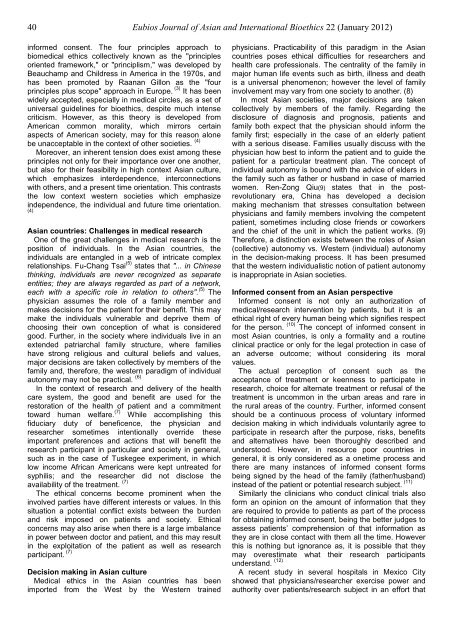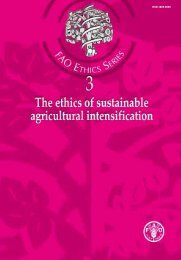Eubios Journal of Asian and International Bioethics - Eubios Ethics ...
Eubios Journal of Asian and International Bioethics - Eubios Ethics ...
Eubios Journal of Asian and International Bioethics - Eubios Ethics ...
Create successful ePaper yourself
Turn your PDF publications into a flip-book with our unique Google optimized e-Paper software.
40 <strong>Eubios</strong> <strong>Journal</strong> <strong>of</strong> <strong>Asian</strong> <strong>and</strong> <strong>International</strong> <strong>Bioethics</strong> 22 (January 2012)<br />
informed consent. The four principles approach to<br />
biomedical ethics collectively known as the "principles<br />
oriented framework," or "principlism," was developed by<br />
Beauchamp <strong>and</strong> Childress in America in the 1970s, <strong>and</strong><br />
has been promoted by Raanan Gillon as the "four<br />
principles plus scope" approach in Europe. (3) It has been<br />
widely accepted, especially in medical circles, as a set <strong>of</strong><br />
universal guidelines for bioethics, despite much intense<br />
criticism. However, as this theory is developed from<br />
American common morality, which mirrors certain<br />
aspects <strong>of</strong> American society, may for this reason alone<br />
be unacceptable in the context <strong>of</strong> other societies. (4)<br />
Moreover, an inherent tension does exist among these<br />
principles not only for their importance over one another,<br />
but also for their feasibility in high context <strong>Asian</strong> culture,<br />
which emphasizes interdependence, interconnections<br />
with others, <strong>and</strong> a present time orientation. This contrasts<br />
the low context western societies which emphasize<br />
independence, the individual <strong>and</strong> future time orientation.<br />
(4)<br />
<strong>Asian</strong> countries: Challenges in medical research<br />
One <strong>of</strong> the great challenges in medical research is the<br />
position <strong>of</strong> individuals. In the <strong>Asian</strong> countries, the<br />
individuals are entangled in a web <strong>of</strong> intricate complex<br />
relationships. Fu-Chang Tsai (5) states that "... in Chinese<br />
thinking, individuals are never recognized as separate<br />
entities; they are always regarded as part <strong>of</strong> a network,<br />
each with a specific role in relation to others". (5) The<br />
physician assumes the role <strong>of</strong> a family member <strong>and</strong><br />
makes decisions for the patient for their benefit. This may<br />
make the individuals vulnerable <strong>and</strong> deprive them <strong>of</strong><br />
choosing their own conception <strong>of</strong> what is considered<br />
good. Further, in the society where individuals live in an<br />
extended patriarchal family structure, where families<br />
have strong religious <strong>and</strong> cultural beliefs <strong>and</strong> values,<br />
major decisions are taken collectively by members <strong>of</strong> the<br />
family <strong>and</strong>, therefore, the western paradigm <strong>of</strong> individual<br />
autonomy may not be practical. (6)<br />
In the context <strong>of</strong> research <strong>and</strong> delivery <strong>of</strong> the health<br />
care system, the good <strong>and</strong> benefit are used for the<br />
restoration <strong>of</strong> the health <strong>of</strong> patient <strong>and</strong> a commitment<br />
toward human welfare. (7) While accomplishing this<br />
fiduciary duty <strong>of</strong> beneficence, the physician <strong>and</strong><br />
researcher sometimes intentionally override these<br />
important preferences <strong>and</strong> actions that will benefit the<br />
research participant in particular <strong>and</strong> society in general,<br />
such as in the case <strong>of</strong> Tuskegee experiment, in which<br />
low income African Americans were kept untreated for<br />
syphilis; <strong>and</strong> the researcher did not disclose the<br />
availability <strong>of</strong> the treatment. (7)<br />
The ethical concerns become prominent when the<br />
involved parties have different interests or values. In this<br />
situation a potential conflict exists between the burden<br />
<strong>and</strong> risk imposed on patients <strong>and</strong> society. Ethical<br />
concerns may also arise when there is a large imbalance<br />
in power between doctor <strong>and</strong> patient, <strong>and</strong> this may result<br />
in the exploitation <strong>of</strong> the patient as well as research<br />
participant. (7)<br />
Decision making in <strong>Asian</strong> culture<br />
Medical ethics in the <strong>Asian</strong> countries has been<br />
imported from the West by the Western trained<br />
physicians. Practicability <strong>of</strong> this paradigm in the <strong>Asian</strong><br />
countries poses ethical difficulties for researchers <strong>and</strong><br />
health care pr<strong>of</strong>essionals. The centrality <strong>of</strong> the family in<br />
major human life events such as birth, illness <strong>and</strong> death<br />
is a universal phenomenon; however the level <strong>of</strong> family<br />
involvement may vary from one society to another. (8)<br />
In most <strong>Asian</strong> societies, major decisions are taken<br />
collectively by members <strong>of</strong> the family. Regarding the<br />
disclosure <strong>of</strong> diagnosis <strong>and</strong> prognosis, patients <strong>and</strong><br />
family both expect that the physician should inform the<br />
family first; especially in the case <strong>of</strong> an elderly patient<br />
with a serious disease. Families usually discuss with the<br />
physician how best to inform the patient <strong>and</strong> to guide the<br />
patient for a particular treatment plan. The concept <strong>of</strong><br />
individual autonomy is bound with the advice <strong>of</strong> elders in<br />
the family such as father or husb<strong>and</strong> in case <strong>of</strong> married<br />
women. Ren-Zong Qiu(9) states that in the postrevolutionary<br />
era, China has developed a decision<br />
making mechanism that stresses consultation between<br />
physicians <strong>and</strong> family members involving the competent<br />
patient, sometimes including close friends or coworkers<br />
<strong>and</strong> the chief <strong>of</strong> the unit in which the patient works. (9)<br />
Therefore, a distinction exists between the roles <strong>of</strong> <strong>Asian</strong><br />
(collective) autonomy vs. Western (individual) autonomy<br />
in the decision-making process. It has been presumed<br />
that the western individualistic notion <strong>of</strong> patient autonomy<br />
is inappropriate in <strong>Asian</strong> societies.<br />
Informed consent from an <strong>Asian</strong> perspective<br />
Informed consent is not only an authorization <strong>of</strong><br />
medical/research intervention by patients, but it is an<br />
ethical right <strong>of</strong> every human being which signifies respect<br />
for the person. (10) The concept <strong>of</strong> informed consent in<br />
most <strong>Asian</strong> countries, is only a formality <strong>and</strong> a routine<br />
clinical practice or only for the legal protection in case <strong>of</strong><br />
an adverse outcome; without considering its moral<br />
values.<br />
The actual perception <strong>of</strong> consent such as the<br />
acceptance <strong>of</strong> treatment or keenness to participate in<br />
research, choice for alternate treatment or refusal <strong>of</strong> the<br />
treatment is uncommon in the urban areas <strong>and</strong> rare in<br />
the rural areas <strong>of</strong> the country. Further, informed consent<br />
should be a continuous process <strong>of</strong> voluntary informed<br />
decision making in which individuals voluntarily agree to<br />
participate in research after the purpose, risks, benefits<br />
<strong>and</strong> alternatives have been thoroughly described <strong>and</strong><br />
understood. However, in resource poor countries in<br />
general, it is only considered as a onetime process <strong>and</strong><br />
there are many instances <strong>of</strong> informed consent forms<br />
being signed by the head <strong>of</strong> the family (father/husb<strong>and</strong>)<br />
instead <strong>of</strong> the patient or potential research subject. (11)<br />
Similarly the clinicians who conduct clinical trials also<br />
form an opinion on the amount <strong>of</strong> information that they<br />
are required to provide to patients as part <strong>of</strong> the process<br />
for obtaining informed consent, being the better judges to<br />
assess patients’ comprehension <strong>of</strong> that information as<br />
they are in close contact with them all the time. However<br />
this is nothing but ignorance as, it is possible that they<br />
may overestimate what their research participants<br />
underst<strong>and</strong>. (12)<br />
A recent study in several hospitals in Mexico City<br />
showed that physicians/researcher exercise power <strong>and</strong><br />
authority over patients/research subject in an effort that

















